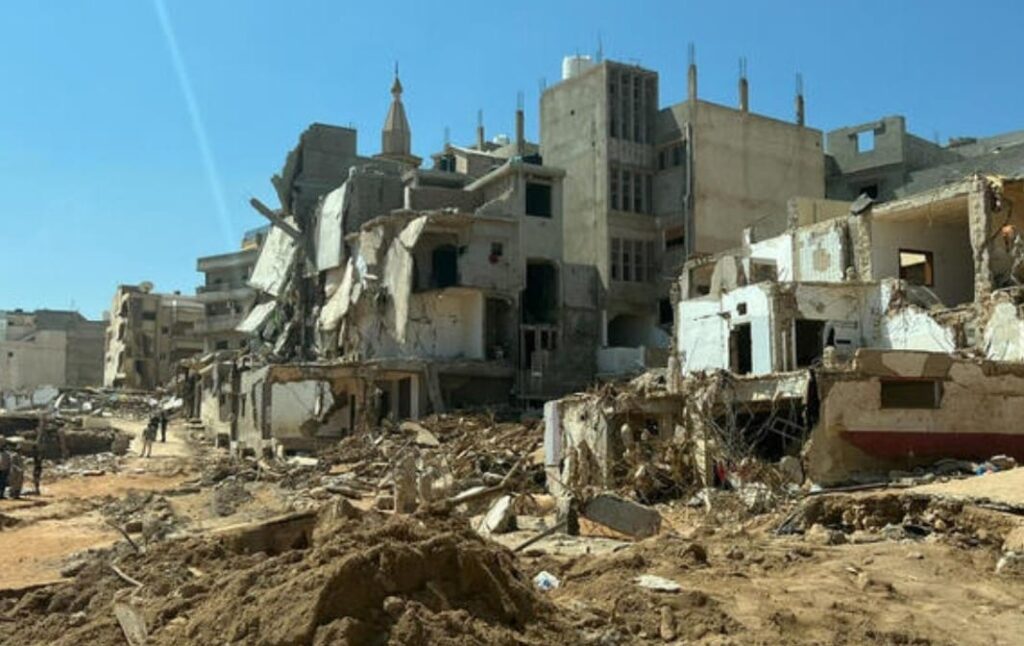
Jenan Taylor
20 September 2023
Australians are being urged to consider donating to relief efforts, as humanitarian groups navigate storm ravaged cities, and the threat of disease in flood-affected Libya.
An estimated 4000 people were killed and tens of thousands displaced when powerful Storm Daniel battered north eastern Libya in early September.
The hurricane triggered the collapse of two dams near the town of Derna, submerging huge swathes of the area and sweeping people out to sea.
According to global conflict monitor the US-based Council on Foreign Relations, more than 300,000 people in the country already experienced need before the floods.
It said much of this was related to civil war that had produced two rival governments in Libya in the wake of former leader Muammar Quadaffi in 2011.
The pre-existing political and socio-economic conditions led the United Nations Office for Humanitarian Coordination to allocate US$10 million to flood intervention and request US$71.4 million to help support those identified as being most in need.
Read more: Sick, children, carers need more help after earthquake: Aid agencies
Faith-based group Caritas Australia, and the Australia office for the United Nations High Commission for Refugees, also launched urgent appeals to help the responses of their agencies on the ground.
These include delivering emergency shelter, food and medicines, and psychosocial support.
Caritas Australia said the storm had destroyed roads, toppled electricity towers, and interrupted telecommunications.
It also reported no clean drinking water in Derna, and said the city’s only hospital was overwhelmed with the bodies of flood victims.
In recent days UN humanitarian officials expressed fears a disease outbreak, linked to contaminated water and poor sanitation, could potentially lead to a second crisis, the Associated Press reported.
Caritas Australia’s humanitarian emergencies associate director, Melville Fernandez said the situation created working challenges.
Mr Fernandez said the country’s civil war had contributed to weakened infrastructure which was making the situation even harder for survivors.
He also said along with the effects of Libya’s protracted insecurities, the scale of the flood damage was hampering relief efforts.
Read more: Teens in Geelong helping earthquake victims in Türkiye and Syria
Tearfund Australia said Libya’s separate governments potentially presented considerable challenges to aid delivery.
The organisation is not directly involved in relief efforts, but is supporting responses as a member of aid network the Emergency Action Alliance.
Effectiveness and humanitarian team leader Phil Lindsay said Tearfund’s experience in and around other conflict zones, including in South Sudan, was that relief agencies would need to be adept at diplomacy.
Mr Lindsay said they would also have to be particularly good at negotiating power structures, including knowing who to talk to and how to talk to them.
He said when there were migrants and asylum-seekers in the disaster area who were also fleeing others conflicts, as was the case in Libya, it added to the complexity of the response.
“The humanitarian principle is always to work with whoever needs the most support irrespective of their political, faith or country affiliations, but in this situation, agencies have to not only try to identify who their target group is, they’d have to make hard decisions around who among them was neediest,” Mr Lindsay said.
“With finite resources and overwhelming numbers of people in need, how do you determine who you’re going to work with? These are real challenges.”
Mr Lindsay urged Australians to donate to the appeals and pray for all affected by the Libyan disaster.
To donate to Caritas Australia, see here.
To donate to Australia for UNHCR, see here.
For more faith news, follow The Melbourne Anglican on Facebook, Instagram, or subscribe to our weekly emails.






